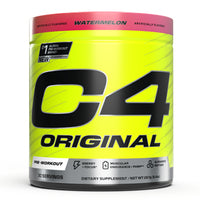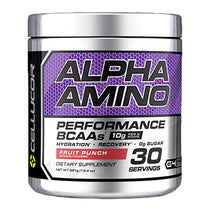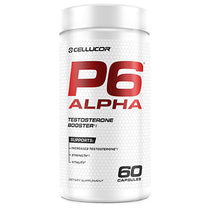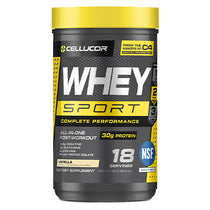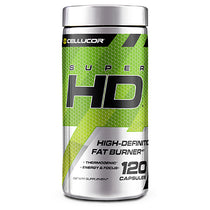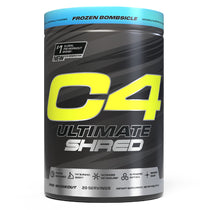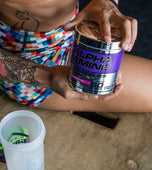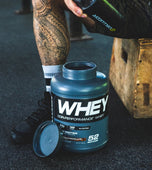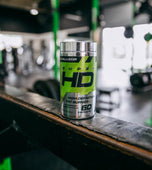Caffeine is the most commonly consumed stimulant in the world, with an estimated 90% of Americans getting their caffeine fix in one form or another every single day. [1]
It also serves as the backbone for nearly every pre-workout on the market, including the full C4® lineup.
Despite its widespread and habitual usage, many people don’t really understand how caffeine works, or what it does in the body beyond increasing energy and alertness.
Here, we discuss the ins and outs of caffeine as a stimulant and ergogenic aid, and how to best use it to optimize your mental and physical performance.
What is Caffeine?
Caffeine is a methylxanthine naturally occurring in numerous plants, including coffee, tea, and guarana. It stimulates the central nervous system (CNS), helping to prevent the onset of fatigue and heighten alertness.
How Long Does It Take For Caffeine to Kick In?
Following ingestion, caffeine easily crosses the blood-brain barrier, and its energy-boosting effects can be realized in as little as 20 minutes. However, it takes nearly one hour for caffeine concentrations to peak in the bloodstream and for the effects to become fully pronounced. [2]
How Long Does Caffeine Last?
Caffeine has a half-life of roughly five hours, which means that if you were to consume 100 mg of caffeine at 9 in the morning, by the time 2 PM rolled around, you’d still have around 50 mg of caffeine in your system. However, while the body is still metabolizing some portion of the caffeine several hours later, its effects peak at the one-hour post-ingestion mark and begin to fade 3-4 hours after ingestion.

What does caffeine do to your body?
Caffeine's primary mechanism of action is that of an adenosine receptor antagonist in the brain. [3] Adenosine is an inhibitory neurotransmitter, and when it binds to the adenosine receptors in the brain, it depresses CNS activity, promoting sleepiness and decreasing arousal.
Caffeine bears a similar molecular structure to adenosine. As such, it is capable of binding to adenosine receptor sites, primarily A1 and A2a. When caffeine attaches to these receptors, the adenosine molecules are essentially “blocked out," or inhibited. As a result of this inhibition, wakefulness, arousal, and energy increase.
But there’s more! Caffeine has also been shown to stimulate dopamine receptors. [4] Not only does this lead to increased concentrations of dopamine (the “motivation and reward” molecule), but caffeine has also been shown to increases dopamine receptor availability. In addition to its mood and motivation-enhancing effects, dopamine is also involved in motor control, making it an essential component of athletic performance, strength, and power. [5]
Caffeine isn’t effective strictly for physical performance either. It can also provide a potent mental boost. Studies have found that caffeine, even when used in doses as low as 32 mg, is capable of enhancing mood, performance, vigilance, and reaction times. [7]

Does Caffeine Increase Blood Pressure & Reduce Blood Flow?
It’s commonly thought that drinking caffeine causes an increase in blood pressure and may restrict blood flow. While it’s true that in certain individuals (usually those who aren’t regular indulgers), caffeine may lead to a small (3–4 mmHg) increase in blood pressure, these effects are short-lived and generally fade the more regularly an individual partakes of energy-boosting elixirs. [6,8,9]
It’s also believed that caffeine is a vasoconstrictor, limiting blood flow, which could impair performance and muscle pumps. It’s true that caffeine can lead to vasoconstriction—but of blood vessels in the brain. This is why you see caffeine included as one of the ingredients in migraine formulas. However, several long-term studies have found that regular ingestion of caffeine is not responsible for hypertension (high blood pressure). [6,10]
Furthermore, caffeine may actually support greater blood flow (and with it, muscle pumps) via the inhibition of PDE enzymes, which can lead to increases in nitric oxide production. [11]
Also remember that caffeine has been noted to increase endurance and strength, while reducing perceived exertion, which would allow you to bang out more reps before succumbing to fatigue, again boosting performance and pumps!
How much caffeine should you take?
Every individual will have a slightly different response to a given dose of caffeine. Some people are fast metabolizers, while others are slow. Your own tolerance to caffeine also needs to be considered when deciding how much to use.
That said, scientific studies investigating the performance-boosting potential of caffeine note that benefits are derived when dosing caffeine between 3-6 mg/kg of bodyweight. [12]
For example, a man weighing 80 kg, roughly 176 pounds, could use between 240-480 mg of caffeine dosed about an hour before their training or competition to derive performance benefits from caffeine ingestion.
It’s typically advised to start on the low end with caffeine, assess your reaction, and manipulate your own does up or down accordingly. If you are someone who rarely uses caffeine, you may even need to start beneath the 3 mg/kg threshold just to be cautious.

How much caffeine in your C4?
As stated before, each person has their own preference when it comes to how much caffeine they want in a pre-workout or performance energy drink. Some people like a lot and others want very little, or even no caffeine at all.
The amount of caffeine you want may also differ by occasion—as in, you might want a lot of caffeine before a tough workout, less before an easy workout, just a little before cardio, and the list goes on.
Because of the wide range of individual needs and occasion-based differences, we've engineered a diverse line of pre-workout supplements to fit your caffeine preference.
Use this quick list as C4® shopping guide to find the right products for your goals, workouts, and lifestyle. You may even find that you want different products for different caffeine needs!
C4 Sport Pre-Workout: 135mg caffeine per scoop
C4 Sport is a pre-workout optimized for exercise and combines two formulations to support performance and energy into one, so every base of your workout is covered. With C4 Sport we’ve gone the extra mile and obtained NSF Certified for Sport® certification which is important for pro-athletes and everyday athletes alike. Certified for Sport® is the only independent third-party certification program recognized by MLB, the MLB Players Association, the NHL and the CFL.
C4 Ripped Sport Pre-Workout: 135mg caffeine per scoop
C4 Ripped Sport combines the powerful energy of C4 Sport with a revolutionary fat-loss formula, resulting in a best-in-class pre-workout that can help give you what you need to perform your best—whether it’s on the field, on the track, or in the gym. C4 Ripped Sport can be your teammate on the way to shredding up your physique and your fitness goals.
C4 Original Pre-Workout: 150mg caffeine per scoop
Millions of people—ranging from beginners all the way up to the elite competitors, have relied on C4 pre-workout to help them turn their ambitions into achievements. As America’s #1 selling pre-workout, C4 Original lives up to its solid reputation with a classic formula for advanced energy, endurance, focus, and pumps!
C4 Ripped Pre-Workout: 150mg caffeine per scoop
When you want to lose fat without stripping away muscle, the trifecta is a clean diet, proper training, and the right supplementation. C4 Ripped is a pre-workout supplement that combines the explosive energy of C4 Original with ingredients specific to fat loss. This formula helps you train harder while supporting your body’s ability to burn fat.
C4 Energy: 200mg caffeine per bottle
C4 Energy is a pre-mixed pre-workout drink you can grab when you need it most. Its formula boosts energy and focus, and its portable packaging makes it the perfect solution for pre-workout convenience. Just grab a fresh, icy-cold bottle and go workout!
C4 Original Carbonated: 200mg caffeine per can
Canned, carbonated, and charged with the explosive energy and legendary performance of C4 Original, C4 On The Go Carbonated is the perfect fuel for your fitness journey. C4 On The Go Carbonated tastes amazing and contains zero sugar, zero calories, and zero total carbs.
C4 Extreme Pre-Workout: 200mg caffeine per scoop
Over two years in the making, spanning multiple formula tweaks and hundreds of flavor tests, C4 Extreme has been reengineered and reimagined from the ground up to help support explosive energy, extreme performance, powerful pumps, and mental alertness. Building on the legendary C4 performance formula, C4 Extreme is formulated with the following patented and clinically studied ingredients in to fuel your most extreme training sessions.
C4 Ultimate Pre-Workout: 300mg caffeine per scoop
C4 Ultimate is the most powerful C4 we've ever created. This maxed-out formula also packs a heavy punch of nootropics, mood enhancers, pump amplifiers, and endurance boosters to push you to your ultimate limit. C4 Ultimate will challenge you to push for one more rep, one more set, and to pick up that heavy dumbbell you’ve been thinking about for weeks.
C4 Ultimate Carbonated: 300mg caffeine per can
This is NOT an energy drink. This is the Ultimate, explosive, super-charged, no-holds-barred, can of domination, engineered for the elite among us who demand limitless ammo in their battle for gym supremacy. C4 Ultimate On The Go Carbonated will fuel you through the most grueling workouts while delivering incredible flavors and the perfect amount of carbonation to kick-start your taste buds.
C4 Ultimate Non-Carbonated: 300mg caffeine per bottle
C4 Ultimate On The Go is packed with a muscle punch of ingredients for focus, pumps, and endurance like what we put into Ultimate powder, but in an ultra-portable bottle that’s perfect for throwing in the car or in your gym bag before you head out. It’s more convenient than ever to be Ultimate, and with C4 Ultimate On The Go, you’ll have even more time to spend crushing your workouts and obliterating your goals.
C4 Ultimate Shred Pre-Workout: 300mg caffeine per scoop
With a revolutionary fat-loss formula built on top of the world’s most explosive energy core, it’s a fat-burning pre-workout unlike anything on the market. C4 Ultimate Shred’s cutting-edge blend of Capsimax® Cayenne, Oligonol®, clinically studied DygloFit™, and Bioperine® will help you achieve extreme definition. In fact, the Capsimax® content in C4 Ultimate® Shred has been shown to increase resting energy expenditure to the equivalent of running one mile a day. In other words, it's the super-charge your shred has been looking for.

References
- Heckman, M. A., Weil, J. and De Mejia, E. G. (2010), Caffeine (1, 3, 7‐trimethylxanthine) in Foods: A Comprehensive Review on Consumption, Functionality, Safety, and Regulatory Matters. Journal of Food Science, 75: R77-R87. https://doi.org/10.1111/j.1750-3841.2010.01561.x
- "About Caffeine." University | Villanova University, www1.villanova.edu/villanova/studentlife/health/promotion/goto/resources/drugs/caffeine.html.
- Dunwiddie TV, Mansino SA. 2001. The role and regulation of adenosine in the central nervous system. Ann Rev Neurosci 24:31–55
- Volkow ND, Wang GJ, Logan J, et al. Caffeine increases striatal dopamine D2/D3 receptor availability in the human brain. Transl Psychiatry. 2015;5(4):e549. Published 2015 Apr 14. doi:10.1038/tp.2015.46
- Lieberman, H. R., Wurtman, R. J., Emde, G. G., Roberts, C., & Coviella, I. L. (1987). The effects of low doses of caffeine on human performance and mood.Psychopharmacology, 92(3), 308–312.
- Geleijnse JM. Habitual coffee consumption and blood pressure: an epidemiological perspective. Vasc Health Risk Manag. 2008;4(5):963–970.
- Gilbert, C. (1995). Optimal physical performance in athletes: key roles of dopamine in a specific neurotransmitter/hormonal mechanism. Mechanisms of Ageing and Development, 84(2), 83–102.
- R., L. W., F., W. M., S., V. A., Hee, S. B., S., M. B., & L., W. T. (2004). Blood Pressure Response to Caffeine Shows Incomplete Tolerance After Short-Term Regular Consumption. Hypertension, 43(4), 760–765. https://doi.org/10.1161/01.HYP.0000120965.63962.93.
- Nurminen, M. L., Niittynen, L., Korpela, R., & Vapaatalo, H. (1999). Coffee, caffeine and blood pressure: a critical review. European Journal of Clinical Nutrition, 53(11), 831—839. https://doi.org/10.1038/sj.ejcn.1600899.
- Rhee JJ, Qin F, Hedlin HK, et al. Coffee and caffeine consumption and the risk of hypertension in postmenopausal women. Am J Clin Nutr. 2015;103(1):210-7.
- Darío Echeverri, Félix R. Montes, Mariana Cabrera, Angélica Galán, and Angélica Prieto, “Caffeine's Vascular Mechanisms of Action,” International Journal of Vascular Medicine, vol. 2010, Article ID 834060, 10 pages, 2010. https://doi.org/10.1155/2010/834060.
- Goldstein, E. R., Ziegenfuss, T., Kalman, D., Kreider, R., Campbell, B., Wilborn, C., Antonio, J. (2010). International society of sports nutrition position stand: caffeine and performance. Journal of the International Society of Sports Nutrition, 7(1), 5. https://doi.org/10.1186/1550-2783-7-5.
